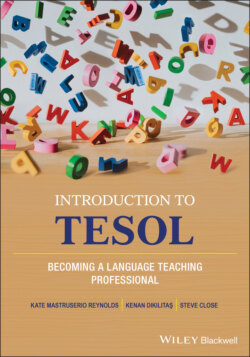Читать книгу Introduction to TESOL - Kate Reynolds - Страница 58
WIDA (https://wida.wisc.edu)
ОглавлениеWIDA has become an influential organization for individuals teaching English since its inception in 2003. WIDA comprises two consortia: WIDA Consortium, which is made up of 41 U.S. states and territories, and WIDA International School Consortium, a network of over 400 international schools worldwide. In these locations, WIDA works with educational leaders, school districts, public and private schools, and pre-K–12 educators on assessment and professional development.
WIDA’s mission is to “advance academic language development and academic achievement for children and youth who are culturally and linguistically diverse through high quality standards, assessments, research and professional learning for educators” (WIDA, n.d.). To achieve that goal, the organization offers language standards, proficiency descriptors, and assessments of academic English for use in screening, placing, and guiding instructors of ELLs (see Chapter 1). The WIDA standards span five areas:
Standard 1: Social and Instructional Language;
Standard 2: Language of Language Arts;
Standard 3: Language of Mathematics;
Standard 4: Language of Science; and
Standard 5: Language of Social Studies.
WIDA provides professional development opportunities for educators in using their standards in curricular and lesson planning and developing instructional techniques in areas, such as creating a welcoming environment for ELLs, teaching academic vocabulary, and teaching for comprehension. Its self-paced e-workshops range in topics from engaging newcomer multilingual learners to developing language for learning in math, foundational concepts, and leading for equity.
WIDA has influenced education practices worldwide with its “can do” descriptors, which highlight what a language learner can do with speaking, listening, reading, and writing when they are at a specific grade and proficiency level. For example, a student in grades 4–5 at proficiency level 3 can explain clear sequential procedures to peers and compare data or information (WIDA, 2016) (for more detail, see https://wida.wisc.edu/teach/can-do/descriptors).
Initially, WIDA developed a standardized assessment of ELLs’ academic language based on the standards, called the ACCESS test. The organization later developed placement-screening assessments. It conducts professional development for educators wishing to help ELLs prepare for the assessment and those interested in learning to administer it.
WIDA offers a conference in October annually in various cities in North America for educators to learn from each other about WIDA’s resources. Internationally, it offers institutes, symposiums, and workshops. School districts and schools can arrange for a WIDA-prepared facilitator to conduct a workshop on topics such as differentiation, classroom action research, educator collaboration, formative language assessment, and purposeful lesson planning.
